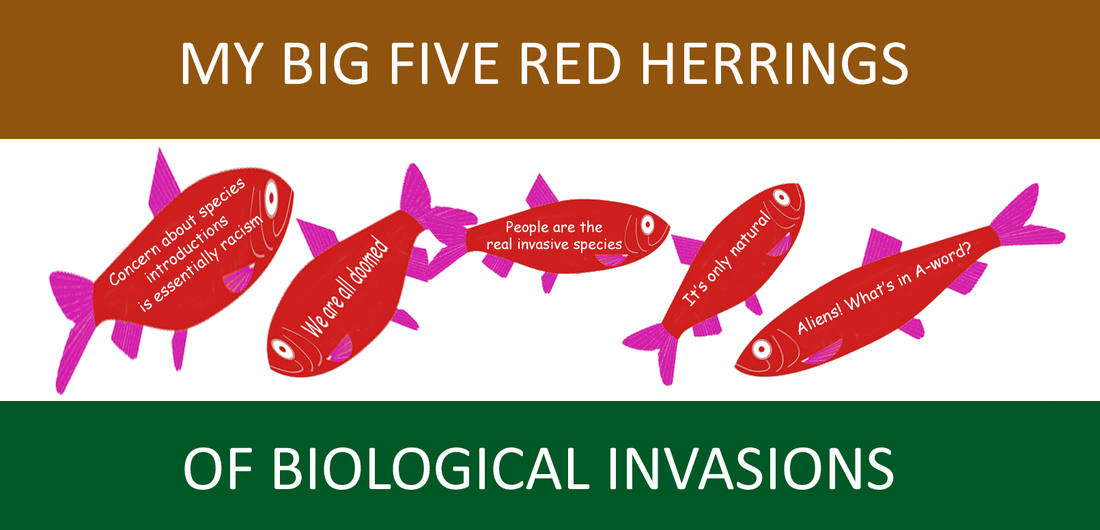At some point in almost every meeting to discuss biological invasions somebody will make a statement along the lines of “humans are the worst invasive species on planet Earth and we should do something about ourselves first before thinking about other species”. This statement is sometimes politely acknowledged and/or echoed before moving swiftly on with the business of the day. In other instances this opening salvo can catalyse a fierce and polarised debate about man’s potential for good and evil. Back-and-forths will occasionally ensue about the nature of the term introduced invasive species – if a criterion for introduced invasive species is human mediated dispersal how can humans be invasive when they are dispersed as humans not by humans (the slave trade and other imposed migrations being notable exceptions)? And so things degenerate into an orgy of philosophising and pedantry; aka a long, winding and deeply entrenched road to nowhere. In the heat of the debate the fence sitters – the less articulate, less passionate or less interested - will have either joined one of the opposing camps or turned off the debate altogether. By the time things have moved on, both the snoozers and the bruisers may struggle to revive and/or reconcile.
Red Herring #1 is a variation on the theme that humanity is the cause of all environmental problems. Misanthropy - hatred, dislike, or distrust of humankind - has deep roots in the environmental movement. At its most extreme this attitude represents a form of self-hatred applied to the humanity as a whole. “Phasing out the human race” said Dave Forman - founder of the radical environmental organisation Earth First! - “will solve every problem on earth, social and environmental.” Even Maurice Strong, first Executive Director of the considerably less radical organisation - the United Nations Environment Programme (UNEP) - asked “Isn't the only hope for the planet that the industrialized civilizations collapse?" Quotes such as these are gleefully seized upon by right wing anti-environmental groups and used as tar to be liberally brushed upon all those who care about the state of our planet.
Strictly speaking there is some truth to Forman’s statement. All social and environmental problems will be solved without people, as social and environmental problems are human constructs - ten out of ten for accuracy but zero out of ten for utility. A less extreme standpoint may be to highlight the urgent need for a reduction in human populations as part of a sustainable growth strategy. However, even this focus also doesn't help us to act constructively on the management of biological invasions as (ethically acceptable) population reduction, even if achievable, would take some time. We have to act from where we are and not where we would like to be. So although we are unquestionably the sole driver of biological invasions, we are also the only solution.
It is paradoxical that the human race is capable of the highest and the lowest of acts. We can initiate wars and feed the starving, perpetrate genocides and devote ourselves to the sick, commit terrorist atrocities and risk death in non-violent protest. We are a world of Hitler’s and Gandhi’s, Pol Pot’s and Mandela’s, Bin Laden’s and Mother Theresa’s. There are problem sides and solution sides to every issue and we need to focus on the solution side of the issue if we are to persuade others that our cause is worthwhile. Self-flagellation saps energy and enthusiasm while a focus on things we can achieve is empowering and energising. Whether you are an optimist or a pessimist you are right; and it does not serve our purpose to be a pessimist.
Some suggestions for addressing Red Herring #1
Forewarned is forearmed. Those who facilitate meetings on the subject of biological invasions need to be aware that the topic of humanity as the world’s worst invader will inevitably arise. Address the issue proactively and list the following reasons why the subject does not merit a long and detailed discussion: 1) Red Herring #1 has crude explanatory power but it does not help us find solutions; 2) Red Herring #1 can stimulate divisive and non-productive exchanges and we need to act in a coherent way if we are to make progress; 3) A fixation with Red Herring #1 wastes much of our valuable mental bandwidth on something over which we have very little control - a sure fire path to burnout.
Broadcast this message from the rooftops: We are the source of AND the solution to all environmental and social problems!!
Coming up next: Red Herring #2: We’re all doomed - So what’s the point of doing anything!





 RSS Feed
RSS Feed
